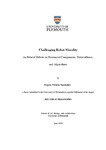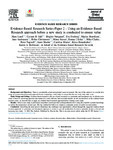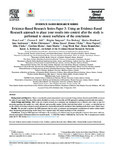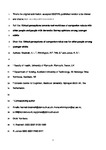Challenging Robot Morality: An Ethical Debate on Humanoid Companions, Dataveillance, and Algorithms
| dc.contributor.supervisor | Drayson, Hannah | |
| dc.contributor.author | Stamboliev, Eugenia | |
| dc.contributor.other | School of Art, Design, and Architecture | en_US |
| dc.date.accessioned | 2019-06-11T14:01:37Z | |
| dc.date.issued | 2019 | |
| dc.identifier | 10492433 | en_US |
| dc.identifier.uri | http://hdl.handle.net/10026.1/14295 | |
| dc.description.abstract |
In this thesis, I reflect on ethical, moral, and agenthood debates around social and humanoid robots in two ways. I focus on how the technological agency of social robots is understood in ethical canons by shifting from moral concerns in Robot Ethics to data-related ethical concerns in Media and Surveillance Studies. I then move to wider debates on morality, agenthood, and agencies in Machine and Computer Ethics research, so as to highlight that social robots, other robots, machines, and algorithmic structures are often moralised but not understood ethically. In that vein, I distinguish between these two terms to point to a wider critique on the anthropocentric and anthropomorphic tendency in ethical streams, so as to view technology from a morality-aligned standpoint. I undertake a critical survey of current ethical streams and, by doing so, I establish a transdisciplinary ethical discussion around social robots and algorithmic agencies. I undertake this research in two steps. First, I look at the use of humanoid social robots in elderly care, as discussed in Robot Ethics, and expand it with a view from Media and Surveillance Studies on data concern around robots. I hereby examine the social robot and the allocation of its ethical and moral agency as an anthropomorphised and humanoid companion, data tracking device, and Posthumanist ethical network of agencies. This is done to amplify the ethical concerns around its pseudo-agenthood and its potential position as dataveillance. Next, I move on to streams in the Philosophy of Technology (POT) and Machine/Computer Ethics. Here, I discuss concepts on machinic moral agency in digital systems. As I pass from the social robot as a humanoid pseudo-agent towards moralised algorithmic structures, I lay out wider conflicts in morality research streams. Specifically, I address their epistemological simplification and reduction of moral norms to digital code, as well as the increasing dissolvement of accountable agenthood within algorithmic systems. By creating a transdisciplinary investigation on techno-ethical and techno-moral canons and their agency models, I urge for a holistic ethics that, first, gives a greater focus to human agent accountability and moral concerns in the application of robots and, second, negotiates new moral or social norms around the use of robots or digital media structures. This is aligned with increasing concerns around the growing commodification of health data and the lack of transparency on data ownership and privacy infringement. | en_US |
| dc.description.sponsorship | University of Plymouth | en_US |
| dc.language.iso | en | |
| dc.publisher | University of Plymouth | |
| dc.rights | CC0 1.0 Universal | * |
| dc.rights.uri | http://creativecommons.org/publicdomain/zero/1.0/ | * |
| dc.subject | Robot Ethics | en_US |
| dc.subject | Posthumanism | en_US |
| dc.subject | Data Ethics | en_US |
| dc.subject | Machine Morality | en_US |
| dc.subject | Elderly Care | en_US |
| dc.subject | Media and Surveillance Studies | en_US |
| dc.subject | Anthropomorphism and Ethics | en_US |
| dc.subject | Dataveillance | en_US |
| dc.subject | Algorithmic Autonomy and Ethics | en_US |
| dc.subject | Social and Humanoid Robots | en_US |
| dc.subject | Applied Ethics | en_US |
| dc.subject.classification | PhD | en_US |
| dc.title | Challenging Robot Morality: An Ethical Debate on Humanoid Companions, Dataveillance, and Algorithms | en_US |
| dc.type | Thesis | |
| plymouth.version | publishable | en_US |
| dc.identifier.doi | http://dx.doi.org/10.24382/389 | |
| dc.identifier.doi | http://dx.doi.org/10.24382/389 | |
| dc.rights.embargodate | 2019-12-11T14:01:37Z | |
| dc.rights.embargoperiod | 6 months | en_US |
| dc.type.qualification | Doctorate | en_US |
| rioxxterms.version | NA |
Files in this item
This item appears in the following Collection(s)
-
01 Research Theses Main Collection
Research Theses Main






